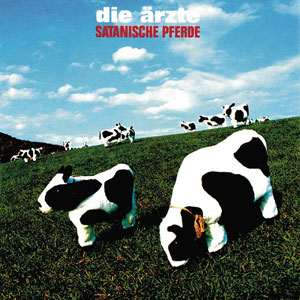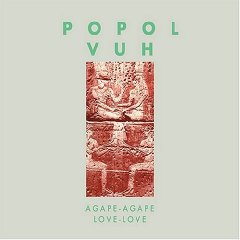Popol Vuh were a German musical collective founded by keyboardist Florian Fricke in 1969 together with Frank Fiedler, Holger Trülzsch (percussion), and Bettina Fricke. Other important members during the next two decades included Djong Yun, Renate Knaup, Conny Veit, Daniel Fichelscher, Klaus Wiese, and Robert Eliscu. The band took its name from the Mayan manuscript containing the mythology of highland Guatemala's K'iche' people.
Daniel "Danny" Secundus Fichelscher,, is a German multi-instrumentalist who played a pivotal role in Krautrock band Popol Vuh, was a member of the German group Gila and is currently Amon Düül II's drummer. Fichelscher is the son of jazz pianist and singer Toby Fichelscher.

Florian Fricke was a German musician who started his professional career with electronic music, using the Moog synthesizer, and was a founding member of the Krautrock band Popol Vuh.

Satanische Pferde is the third live album by German rock band Die Ärzte and featured leftover songs from Wir wollen nur deine Seele. It was only available to the fan club members. The name is a pun on The Satanic Verses.

"Du willst mich küssen" [You want to kiss me] is a punk song by Die Ärzte. It was the first track and the second single from their 1985 album Im Schatten der Ärzte. The maxi version was later put on "Das Beste von kurz nach früher bis jetze". The song's about a totally non-provocative man, who meets a "very provocative" girl, who wants to kiss him.
Mondsucht is a German electronic musical group. It was formed by Astrid M., Robert N. and Olaf K. in 1998. The lyrics are in German and/or English, supported by male and female vocals.

Aguirre is the seventh album by German band Popol Vuh. It contains music used in the soundtrack to Werner Herzog's film Aguirre, the Wrath of God (1972), first released as an album in 1975 on Ohr, and reissued in 2004 by SPV with one bonus track. The soundtrack gained the band comparisons to renowned ambient musician Brian Eno. This score was the first of many filmic collaborations between the group and Herzog. Only two tracks are from the film; the rest were gathered from various recordings done by the group during the period 1972–74, including alternative versions of two songs originally released on the band's 1974 album, Einsjäger und Siebenjäger.

Seligpreisung is the fourth album by German band Popol Vuh. It was originally released in 1973 on record label Kosmische Musik. The title is the German name for the Beatitudes, from Christ's Sermon on the Mount.

Einsjäger und Siebenjäger is the fifth album by Popol Vuh. It was originally released in 1974 on Kosmische Musik. In 2004 SPV re-released the album with two bonus tracks. "Wo bist Du?" was originally released on Popol Vuh's album Die Nacht der Seele as "Wo bist Du, der Du überwunden hast?".

Das Hohelied Salomos is the sixth album by Popol Vuh. It was originally released in 1975, on United Artists Records. In 2005, SPV re-released the album with three bonus tracks.

Letzte Tage – Letzte Nächte is the eighth album by Popol Vuh. It was originally released in 1976 on United Artists Records. In 2005 SPV re-released the album with three bonus tracks.

Herz aus Glas is the ninth album by Popol Vuh. It was originally released in 1977 on Brain Records. In 2005 SPV re-released the album with two bonus tracks. This album was released as the original motion picture soundtrack of Heart of Glass by German director Werner Herzog, but in fact only two tracks were actually featured in the film.

Nosferatu is the eleventh album by Popol Vuh and was released as the original motion picture soundtrack of Nosferatu: Phantom der Nacht by director Werner Herzog. It was originally released in 1978 as On the Way to a Little Way. In 2004 SPV re-released the album with a slightly different track list and adding four tracks originally released on the Popol Vuh album Brüder des Schattens – Söhne des Lichts.

Brüder des Schattens – Söhne des Lichts is the tenth album by Popol Vuh. It was originally released in 1978 on Brain Records. In 2006 SPV re-released the album with one bonus track that was originally released on the remix compilation Sing, for Song Drives Away the Wolves in 1993. The first two tracks from this album were used for the soundtrack of Werner Herzog's film Nosferatu the Vampyre.

Sei still, wisse ICH BIN is the thirteenth album by Popol Vuh. It was originally released in 1981 on Klaus Schulze's record label Innovative Communication. In 2006 SPV re-released the album with one bonus track. "Wehe Khorazin", "Garten der Gemeinschaft", an extract of "Laß los" and "... als lebten die Engel auf Erden" were used in 1982 for the soundtrack of Werner Herzog's film Fitzcarraldo.

Agape – Agape / Love – Love is the fourteenth album by Popol Vuh. It was originally released in 1983 on Uniton. In 2004 SPV re-released the album with one bonus track.

Spirit of Peace is the 15th album by Popol Vuh. It was originally released in 1985 on Cicada. The first track was used by Werner Herzog in the soundtrack for his documentary film The Dark Glow of the Mountains about Reinhold Messner.

Cobra Verde is the sixteenth album by Popol Vuh. It was originally released in 1987 on Milan Records as the original motion picture soundtrack of Werner Herzog's Cobra Verde with Klaus Kinski. In 2006 SPV re-released the album with one bonus track.

For You and Me is the seventeenth album by Popol Vuh. It was originally released in 1991 on Milan Records. In 2006 SPV re-released the album with one bonus track.

City Raga is the eighteenth album by Popol Vuh which was originally released in 1995 on Milan Records.
This page is based on this
Wikipedia article Text is available under the
CC BY-SA 4.0 license; additional terms may apply.
Images, videos and audio are available under their respective licenses.

















